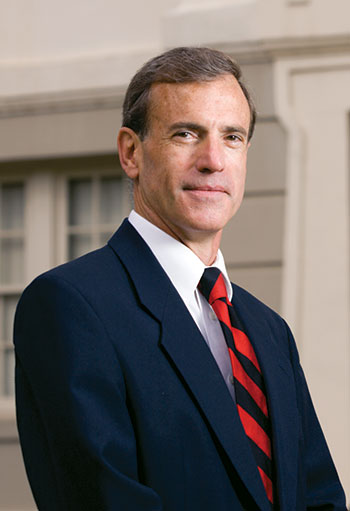
Fred Manget ’79 looks back on a 25-career in intelligence law with the CIA.
Fred Manget ’79 might have spent a career in private practice had the partner he supported as an associate fresh out of law school been able to remember his name.
After graduating summa cum laude from the University of Georgia in 1973, Manget studied philosophy, politics and economics as a Rhodes Scholar at Oxford University before earning his law degree at Vanderbilt as a Patrick Wilson Scholar. He then took a job many law graduates dream of—doing high-level corporate litigation with a large firm. “It was a fine law firm, but about 60 percent of the work I did was for one particular partner, and he kept calling me ‘Frank,’” Manget recalled. “I had been working there for a year and a half, and he came in and said, ‘Frank, can you help me with this?’”
Something snapped. Manget moved to another firm that represented a major software company, allowing him to learn about a new industry just as it was taking off. But he soon realized that he yearned for a career in government service. He had been an Air Force ROTC scholarship cadet at Georgia, and he re-entered the military in 1984, joining the Army Reserve JAG Corps. When the CIA began seeking experienced lawyers with exposure to federal courts in the mid-1980s, Manget’s unusual combination of JAG service and six years of litigation experience gave him an entree. He jumped at the chance to join the CIA’s Office of General Counsel in 1986 and never looked back.
“When you first begin to practice law, you’re never quite sure if what you’re doing is what you want to do,” Manget said. “By the time I went to work for the agency, I knew exactly what I wanted to do—intelligence law. My niche became the intersection between intelligence work and the criminal justice system.” Throughout his career, Manget faced the thorny challenge of protecting the identities of undercover agents testifying in criminal cases while ensuring the state secrets they knew weren’t revealed in a discovery process. “Making sure the agency and intelligence community are protected while getting along with prosecutors can be a full-time job,” he said.
His most harrowing case involved double agent Aldrich Ames, a counterintelligence officer in the CIA’s Soviet division who began providing information to the Kremlin in 1985. “He used to smoke right down the hall from my office,” Manget said.

Questions mounted in the early 1990s about “why a significant number of cases had gone bad,” with agents providing information to the U.S. captured and executed. Manget recalls a tense time during which he and his coworkers knew Ames was under investigation as a suspected mole but had to continue working with him as a colleague—while also avoiding any actions that might tip Ames off that an investigation was underway. “The bureau and the agency had to put one huge effort on hold until his arrest,” Manget said. “When somebody like Ames is caught and exposed, you have to assume he will pass any information he has along to the Russians.”
After Ames was apprehended in 1994, Manget and other intelligence lawyers worked 14-hour days to ensure he could be successfully prosecuted for spying without compromising confidential sources or publicly revealing classified information. “We had to determine whether the rules of criminal procedure required us to turn over any other secrets to Ames’ defense team in discovery,” Manget said.
Ames pled guilty to spying for Moscow a few months after his arrest and is serving a life sentence in a federal prison in Allenwood, Pennsylvania. “It was our hope he would plead guilty, because in a trial, you’re never sure what will happen,” Manget said. “But after he was sent to Allenwood, we also had to monitor his communication and visitors because he still knew classified secrets. He sued me and the CIA director personally, claiming we had violated his constitutional rights.” Lawyers from the Justice Department ably defended the pair.
Manget spent most of his 25-year career with the CIA in its Office of General Counsel, serving as deputy general counsel, acting director of congressional affairs, and as legal counsel to the agency’s Directorate of Intelligence and the Director of Central Intelligence Counterintelligence, Counterterrorist and Terrorist Threat Integration Centers. He was promoted into the Senior Intelligence Service in 1995 and was recognized with several awards throughout his career.
The last decade of Manget’s CIA career focused on terrorism, including the criminal prosecution of terrorists who bombed U.S. embassies in Dar es Salaam, Tanzania, and Nairobi, Kenya, in 1998. “That was treated as a law enforcement matter,” he said. “We had passed laws criminalizing hijacking and worked with the FBI to prosecute terrorists from organizations like Abu Nidal and the Shining Path as criminals. That all changed on September 11, 2001, when we began treating this as an armed conflict. The rules involving criminal prosecution are very different from those governing an armed conflict.”
Manget remembers his assistant rushing into his office on September 11, to inform him that a plane had just flown into the World Trade Center. “We knew immediately it was a planned attack,” he said. “They evacuated the CIA building. Working at the agency was definitely not your normal law practice.”
Now a decade past 9/11, Manget believes that the pendulum is swinging back toward treating terrorist acts as crimes, citing the March 2013 arrest and ongoing prosecution of Sulaiman Abu Ghraith, Osama Bin Laden’s son-in-law, in the U.S. District Court for the Southern District of New York. “It’s an ongoing debate,” he said.
Now retired to his home state of Georgia, Manget is still an avid follower of intelligence law who has taught as a visiting professor at both the Florida State University and University of Georgia law schools. “The current issue is the use of unmanned aerial vehicles—what are the rules of engagement?” he said. “Anything that’s carried out that’s not normal intelligence falls under covert action, and there’s a whole body of law about what covert action is and what you have to do about it. I had a really fascinating career dealing with issues like this that were challenging and interesting and on the frontier of legal practice. My only regret is that I wish I had gone in a little earlier.”